I
know that this has nothing to do with the Ford
Anglia specifically, except for the fact that in
the UK,
you need a Road Fund Licence (commonly known as a
'Tax Disc')
displayed in your vehicle to be able to park it
or use it on the public highway.
(I will only cover the period of
time that the Ford Anglia was available to buy
brand new.)
… but first a
very brief bit of History ...
The familiar “Tax
Disc” (to UK eyes anyway) is a circular
document, approx 75mm in diameter, displayed on
all road vehicles, as a receipt to prove payment
of a tax that allows you to use and park your
vehicle on the public highway in the United
Kingdom.
Displaying of Tax Discs on
vehicles started all the way back in 1921, with
the implementation of the Roads and Finance Act
of 1920, which laid down the specifications for
the first Tax Discs and exactly how they should
be displayed - "by using a holder that shall
be circular". The very first Tax Disc, with
no perforations, was just a plain black and white
rectangular affair and could be purchased to
cover a quarter of a year at a time or for the
whole year, which ended on December 31st.
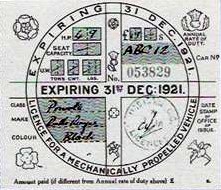
A major innovation
in 1938 was the introduction of perforations
around the outside of the printed circle, making
the Tax Disc much easier to fit into its circular
holder. This particular design of Tax Disc
carried on with minor changes in colour and
wording until 1956, where the disc saw it's first
major redesign. This new design totally lacked
the United Kingdom symbols and no longer had a
box for 'colour'. It also featured two solid
bands of colour at the top and bottom of the
disc.

The Period the Ford
Anglia was Available (1959 - 1968)
The first Tax Disc that
would have been displayed in the new Ford Anglia
105E would have been of this design for 1959
(which also rolled over, but with a different
colour) into 1960.
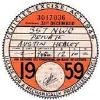 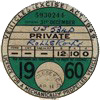
1961 bought about a major
change to the Tax Disc system. In a major effort
to make life harder for the forger, a new design
consisting of various circular vignettes and
bands of solid colour, plus a half-tone
background was launched. Artwork, however was not
the only big change. Monthly taxation was finally
introduced to get away from the bottleneck of the
December 31st expiry date. From January 1961
onwards, one could buy twelve month's car tax at
any time, the Tax Disc you received having
January, February, March etc of the following
year as the expiry date for the first time.
If you purchased your new
Ford Anglia Estate or Ford Thames Van when they
first rolled off the production line,
you would have needed to display a new 1961 style
Tax Disc.
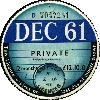
The Tax Disc changed colour
every year in the sequence of blue, brown, green,
and red. The attempt to beat the forgers proved
to be a little off target. The less scrupulous
people found it relatively easy to 'amend'
Guinness bottle labels to mimic the brown colour
of the 1962 tax discs to evade payment.
If you purchased your new
Ford Anglia Super when it first rolled off the
production line,
you would have needed to display a 1962 Tax Disc.
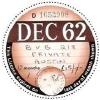
In response to the
supposedly widespread fraud allowed by the
"Guinness Tax Disc" of 1962, the expiry
date was duplicated in the toned area of the
design from 1963 onwards.
If you had bought any of
your favourite Ford Anglia models from 1963 until
its demise in 1967,
then you would have had to display one of the
following types of Tax Discs on your car.
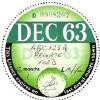 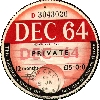 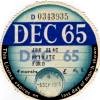 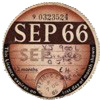 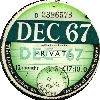 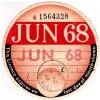
This style of tax disc
remained in vogue up until May 1978, when it
underwent changes yet again.
The Ford Anglia still
requires an up to date tax disc to be displayed,
but, surprisingly for the UK Government,
the cost of this is now zero on any vehicles
constructed before 1st January 1973.
| Even though the tax
disc is free, you will still be fined if
it is not vaild and displayed on your
vehicles windscreen. In the UK the Tax
Disc has to be dislayed on the right hand
side of the windscreen (ie passenger side
of the vehicle). This is so Traffic
Wardens and Police Officers can check
them at a glance from the pavement.
|
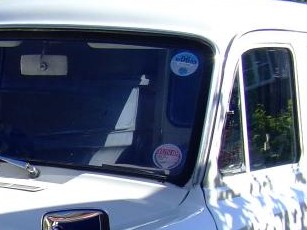 |
Because
a free Tax Disc does not generate any income for
the UK Government or the Driver Vehicle and
Licensing Agency (DVLA), they have thought up
another way of annoying the classic car owner,
"Statutory Off Road Notification". SORN
was introduced in 1998 and is required for a
vehicle that is parked off the public highway, is
permanently garaged or is being restored on your
drive. SORN is free (for now) but failure to
submit a SORN is punishable in the same manner as
failure to pay duty and display a current Tax
Disc.
So there you have it, a
brief history of the Tax Disc over the span of
the Ford Anglia’s production.

(Article Copyright © MellY
Designs - Please do not Reproduce without
Permission)
|

